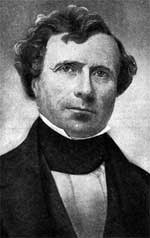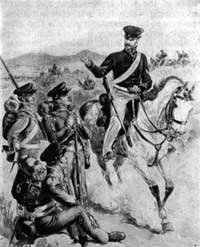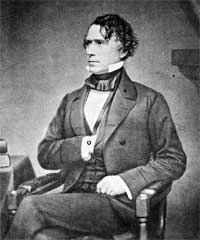Born November 23, 1804 in Hillsboro, New Hampshire, Franklin Pierce became the fourteenth President (1852-56). At age forty-eight, he was the youngest man to have become the Chief Executive up to that time. He was elected during one of the most precarious periods in United States history, when the nation stood on the verge of a civil war over the slavery issue. Personally, Pierce sided with the Southern states and their belief in the right to own slaves as property. Keeping the country unified, however, was also a priority. This conflicted position created many difficulties, and eventually would lead to his being discredited.

 Pierce graduated from Bowdoin College in 1824 and was admitted to the bar in 1827. A Democrat, he served in the state legislature and later became speaker of the New Hampshire House of Representatives. In 1833 he was elected to Congress, and on November 10, 1834, he married Jane Appleton Means. His wife had tuberculosis and did not like being in Washington, so she spent much time at their home in New Hampshire. In 1837 at the age of 32, Franklin became the youngest United States senator; but his wife wanted him to return to Hillsboro, and in 1842 he finally relented. He did not give up politics, however, and became the party boss in New Hampshire. He accepted a position as the state's Attorney General, but declined the opportunity to serve in the Cabinet of President Polk as the nation's Attorney General. Pierce graduated from Bowdoin College in 1824 and was admitted to the bar in 1827. A Democrat, he served in the state legislature and later became speaker of the New Hampshire House of Representatives. In 1833 he was elected to Congress, and on November 10, 1834, he married Jane Appleton Means. His wife had tuberculosis and did not like being in Washington, so she spent much time at their home in New Hampshire. In 1837 at the age of 32, Franklin became the youngest United States senator; but his wife wanted him to return to Hillsboro, and in 1842 he finally relented. He did not give up politics, however, and became the party boss in New Hampshire. He accepted a position as the state's Attorney General, but declined the opportunity to serve in the Cabinet of President Polk as the nation's Attorney General.

 Pierce accepted a military commission from President Polk and served in the Mexican War. He was not what one could call an inspired military leader. In fact, many laughed at him, as he would often faint when going into battle. Some said he was a coward. In 1848, he went back to New Hampshire to resume his position as head of the state's Democratic Party. Pierce did not go looking for his party's presidential nomination. He became the Democratic nominee for President in 1852 after balloting did not produce a winner. Pierce had supported the Compromise of 1850, which made him an acceptable candidate to the South. It was this that got him nominated for President in 1852. He said, "If the Compromise measures are not ... firmly maintained, the Constitution will be trampled in the dust." He believed that the Constitution was a sacred and unchangeable document. Pierce accepted a military commission from President Polk and served in the Mexican War. He was not what one could call an inspired military leader. In fact, many laughed at him, as he would often faint when going into battle. Some said he was a coward. In 1848, he went back to New Hampshire to resume his position as head of the state's Democratic Party. Pierce did not go looking for his party's presidential nomination. He became the Democratic nominee for President in 1852 after balloting did not produce a winner. Pierce had supported the Compromise of 1850, which made him an acceptable candidate to the South. It was this that got him nominated for President in 1852. He said, "If the Compromise measures are not ... firmly maintained, the Constitution will be trampled in the dust." He believed that the Constitution was a sacred and unchangeable document.

 Pierce's administration was faced with Northern outrage over the expansion of slavery and over an increasing prejudice against immigrants. In 1854, he supported the Kansas-Nebraska Act, angering Northerners. The Act would abolish the Missouri Compromise of 1820 and allow newly created territories to decide the slavery question for themselves. This angered Northerners because it made slavery possible in a large area of the West. This caused huge splits in both political parties and added to the conflict between the free and slave states. The struggle over the Kansas-Nebraska Act resulted in the formation of the Republican Party. Pierce's administration was faced with Northern outrage over the expansion of slavery and over an increasing prejudice against immigrants. In 1854, he supported the Kansas-Nebraska Act, angering Northerners. The Act would abolish the Missouri Compromise of 1820 and allow newly created territories to decide the slavery question for themselves. This angered Northerners because it made slavery possible in a large area of the West. This caused huge splits in both political parties and added to the conflict between the free and slave states. The struggle over the Kansas-Nebraska Act resulted in the formation of the Republican Party.
President Pierce became even more unpopular when he took steps to protect the rights of the immigrants. This support, coming as it did during a time of rising prejudice against newcomers from foreign lands, was a main factor in the creation of a new political party called the Know Nothing or American Party. The formation of this and other parties eroded the strength of the Democrats.
Pierce also supported the Fugitive Slave Laws, which returned runaway slaves to their owners. Overall, Pierce's handling of the slavery issue was inept. He kept changing his views, which made him unpopular. He was not elected to a second term.
Pierce was in office during a very prosperous period which witnessed federal land grants that expanded railroads westwards and the Gadsen Purchase. The Gadsden Purchase added land from Mexico to the Territory of New Mexico. The California gold rush was still in full swing.

Franklin Pierce was a mild mannered politician whose presidency was embroiled in complex and controversial issues. To make matters worse, mere days before he was inaugurated, his eleven year-old son was killed before his parents' eyes when a train in which they were riding went over an embankment. Months before, when Pierce was first nominated for President, the child had written to his mother confiding that he hoped Pierce would not win, since neither mother nor child wanted to live in Washington. Pierce's wife was so full of grief over the loss of her son that she withdrew from society, and a family friend, Abigail Kent Means, came to Washington to serve as hostess in the Pierce White House. With the chips stacked against him, Franklin Pierce was not a particularly effective President and left office amidst public denunciation.
Franklin Pierce spent his last years in New Hampshire in virtual seclusion and died in Concord on October 8, 1869.
|

